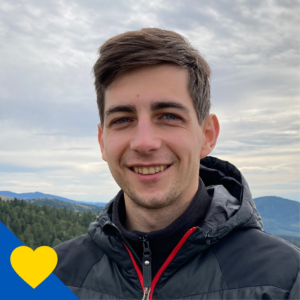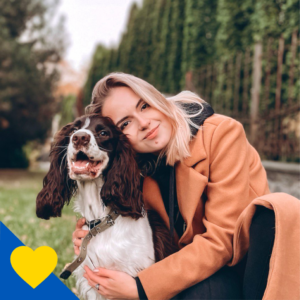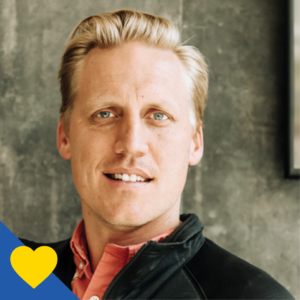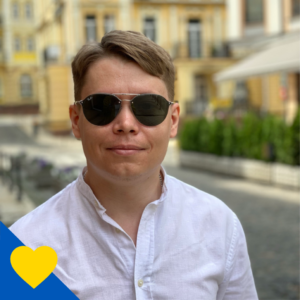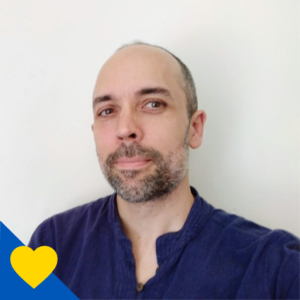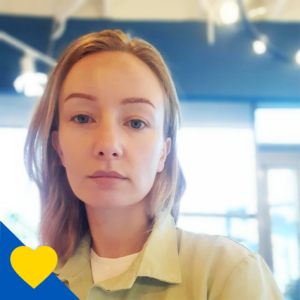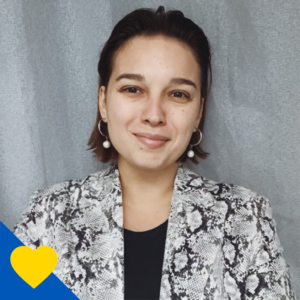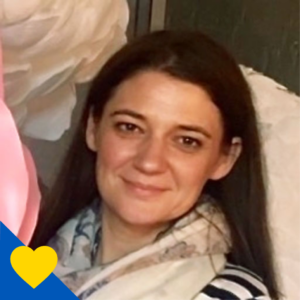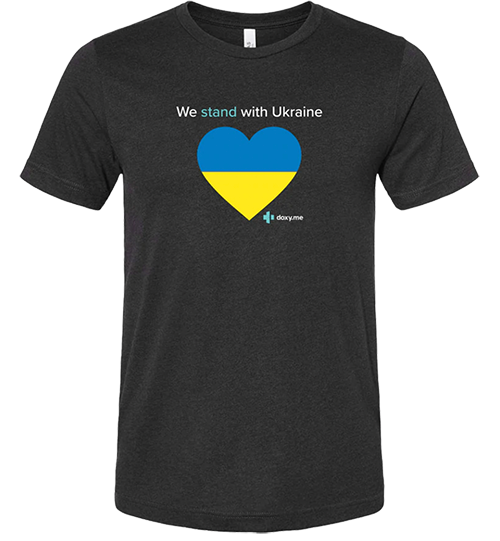
Heroes of Doxy.me: Learning War-Life Balance
Maria and her family were as prepared as they could be for the war, and evacuated to Western Ukraine quickly. After more than 50 days at war, she describes how she—and other Ukrainians—have learned to live their lives during the war.
View Episode Transcript
Maria Final Transcript
Alex:
Okay. Hey, Maria, how are you doing today?
Maria:
Hello, I’m doing fine. Things here are different. It’s changing. Sometimes it’s more calm. Sometimes. It’s not this time today and yesterday it was not really calm. And we had a lot of sirens, but I hope this will stabilize soon, but generally speaking, everything is fine today and I’m fine too.
Alex:
All right. I hope we have a calm day today, but where were you? When was it when you first learned about the invasion starting?
Maria:
We were at home in, we were sleeping. It was night of 24. So February like morning, let’s say morning, 20 fours. Like the evening before I was watching news, I was watching news everyday. Like during two weeks before it started, I woke up and I read news. When I went to bed, I read news. I was looking for some signs that something bad has happened or something good is happening. I really wanted to see that nothing is, we’re not in danger, but there was not such news. And in the morning of 24th of February, it was like 5:20 AM. My grandmother called me and I’m like, I remember she couldn’t even pronounce this. She called me and she asked if I was sleeping and I was like, disappointed. And how sleeping? I’m like, yes, of course I’m sleeping. And I asked what happened and she, she was silent and I was like, disappointed.
Maria:
And I was also sleeping. I didn’t understood. Why is she called? But like the fact that she was called in such early, it was really not a good sign because she never does that. And then I asked again, like what, what’s going on grandmother? And she said it started like, she couldn’t even tell what. And I had to ask what started because I wanted to sleep. I didn’t realize what’s happened. And she’s saying like, the war has started. And then like, as in the movie I hear sirens outside. I hear the word war and I wake up everyone. And like the panic starts. I saw, like I went to the window and I saw people running around people with children, with pets, with their suitcases in the cars, traffic and everybody’s is scared. Nobody knows what to do the sirens. And it was, it was just a really scary to wake up like this.
Maria:
And if it’s the fact that we like till the very end, we all didn’t want to believe this is going to happen. And we told everyone like every day that everything will be fine. Even like the evening before I was talking to my sister. And she said that they had a call in, in, in the company that she works for and they were discussing the threat. And she was scared after this call because they they’re planning some stuff. And they told her everything will be fine. There are no signs that something will happen. Even if there will be any signs we are going to leave and everything will be fine with us. And, and then like six hours later, it happens. And it was really unexpected, I think. And like we had everything. Yeah,
Alex:
Sure. Go ahead.
Maria:
We, we had everything packed and my sister came and it was soon and we packed in the car and we left the home. But at this moment we all had strong feelings that it’s not going to take long time. I took two or three pairs of socks with myself. I thought that it’s going to be not because it’s going to take a couple of days or a week maximum. And, and we, we didn’t really think about like having this for such a long time.
Alex:
Right, right. But thankfully you and those closest to you had some preparation. So what, what happened next? You got all your stuff. You’re out of the house, out of the apartment. You have to go pick up your friend is what, what was, what was the next period of time like for you?
Maria:
So we actually, so we waited at home for a sister and we packed everything to the car and we like just sat in the car and left home in the direction outside of Kyiv when you, so we drove to the Western part of Ukraine to the city where doxyme has opened, will be for office living for like, for, for anyone who would like to work here. But also in case of emergency this hub, should it, it became the place where everyone could stay. And we knew that there is such place and we were driving here, but actually it was really the longest trip I’ve ever had. It took 26 hours to reach view. When you show, like, normally it takes 11 hours driving. It was 26 hours and the road was really hard. I can really tell a lot about this tweet, but generally speaking, it was horrible.
Maria:
So there were like thousands of people trying to escape the city, a huge traffic. We sometimes were moving with the speed less than 0.6 miles per hour. So it’s like no speed at all. And people incarcerated, horrified, and people on the streets were trying to catch the car and also leave the city. And we heard prayer sounds, boom, bang. And I really had a couple of stages of realizing that the war is happening. And it was, it was really like unique experience. Let’s say. So like at first we, like I heard about the war when I woke up and my grandmother told me that there is a war I heard about this. And then I saw it. It was like fifths are of driving. We were still in the city and we saw tanks and huge recalls on the streets and on the side of the road.
Maria:
And they were moving to the place where the huge fight took place, right near the Kyiv. It was really close to us. And I saw all these machines and, but it all, also, it F it felt like I’m watching a movie, like I’m in the car. I have this glass and they see the scars. And I don’t feel that I’m in here too with them. And I couldn’t believe that this is happening to me right now. And then, like, it was when I saw the war. And then when I really felt the war, it was also like six or eight hour of driving. We were still outside, like trying to escape the city. And some heartbreak news arrived and like news about some Ukrainian soldiers got killed. And that was the moment where I really understood that the war is here and people are dying and it’s going to be cruel.
Maria:
And there will be a lot of sad things happening. And this is where it was. It like caught me at that moment. And I finally like, after like 10 hours from the moment I woke up, I understood that I really woke up. And then I understood that this is real. This is closed. This is right here outside of my car. And when we, like, when we heard from the car that was right near us, like mom tells a child that you should eat because in case, if you will need to run, you will not have enough power to run. If you’re not going to eat, it was just heartbreaking. Like this was opening eyes and you understand how actually horrible is what’s going on right now. And it was the first day. And in this whole panic, this understanding was like eye opening thing.
Maria:
But actually the good thing here, like the road was really hard and there’s a lot to tell them, but I will not because it’s going to be too long, but a good, like, just a good thing I wanted to mention is that when we were driving, we, we were really happy to understand that in here, there is someone who is waiting for us. There was our HR, Ukrainian, HR, Lisa, and she was also my friend. And I knew that she is here in VI, in this hub. And we are driving like right here. And when you forget for a moment about everything, that’s going on, this feeling that someone is waiting for you, and you are going to be at least with a roof and in the safe place, it was, it was really supporting us inside. And we were keeping driving and we finally reached the place. And we are really lucky that our company prepared the space where we could at least dress and also leave for some time.
Alex:
Yeah. Feeling like your journey has an end in sight must be very, a real, not relaxing, but a comforting feeling. You said you don’t want to talk about the whole ride, the whole car trip. Cause it would be too long. But is there any, is there one story from there that you would be willing to share with me?
Maria:
Yeah. So there were a lot of cars and everyone tried to reach some destination point. There are a lot of distance possible. The station points on the road from Kyiv to Villa because it’s a huge amount of territory. It’s like the health of Ukraine. And there were less and less cars. But as we were driving, we stopped a couple of times. We didn’t sleep in, in the road, but we stopped a couple of times to drink coffee or to, you know, just rest for five minutes. And the fire we were from Kyiv, the less cars were on the like panic. And let’s say on the guest stations, but they’re still very loud because a lot of people were stopping there to sleep because it’s a secure, there are cameras and nobody will do anything to you. And it was safer to slip there, not somewhere on the side of the road.
Maria:
At some point we stopped to prepare food. We actually took a guests ballon and backpack kitchen, because I was like, I had an old kitchen that is fitting into the backpack and you can just combine the pieces and you will get some fire and you can boil water here, or you can cook something. And we stopped. And we like gathered this kitchen and we boiled water and we had some hot food because on the gas stations, there was not saying we prepared some tea for us. And we also ate noodles and some meat and fish from the can. So it was, it was the first experience of my sister and my boyfriend from Eaton. It’s an outside using this field kitchen because I did that before, when I was camping. And I always wanted to show them how this is being done. And it was really fun, the experience for them, unfortunately in such like critical situation.
Maria:
But we actually took this. We also took a sleeping bags with ourselves because we didn’t know where we were going to live. Like, we didn’t know how it’s going to be. Will we be able to live in a city? So we even thought that we were going to sleep in the car. So we bought a lot of stuff to, to live in the car and was looking to buy this camping, tend to also live somewhere in the forest in case if we need to, there was a lot of panic on the, on the guest stations, near Kyiv, they accepted on the cash and there was nothing in the shop. And there was a woman. She was standing at the door too. And she didn’t let people to come inside the gas station to use the toilet or to buy coffee. She was counting people inside.
Maria:
And then when somebody exited sheets, she was screaming with a strange voice, like two people to toilet. And you were standing in the line like it was so, so creepy. And that’s important because you’re nervous. And then you see something really strange happening on the guest station. Not never have happened before. And you, you think like you’re in some parallel world, when all the gas stations are going to look like this. So this was, this was really interesting three, but it was scary. It was really hard. It was nervous. We were like listening to news, reading us, contacting parents, contacting friends all the time, a lot of communication and the ultimate new information and a lot of stress. But, but we, we do that and I I’m grateful for this experience. And I am, I understand that this was also necessary for us to, to be now in safe place. So this is the part of the journey to
Alex:
All right. And so are you in the Lviv hub? Now
Maria:
We were staying there for almost a month and we didn’t plan to stay there for such a long time. We wanted to rent a flat surprise at one, but there was a huge problem was with the space where to live, because everything that was available was taken and some options where available on some websites, but the price was much higher than a normal price B. So we were, for a long time, we were looking for a normal apartment to leave Spradley. And finally, like after a month, I think we found it. And now, now we are renting a house like, like a flat near the hub. And, but we, we were able to stay in the loop hub and there were people coming and going, and we all lived here like, like a family. Everybody knew each other because we were working. Maybe some people have not seen other people live in your life, but then we all met here and, and who lived here together and it was really fun to experience.
Alex:
Good. I’m glad you got to make those connections with, you know, our colleagues and friends do. How, how are you now? Do you feel safe?
Maria:
So I think I generally feel safe now, but deep inside, I know that nobody in Ukraine is safe, honestly, because you never know where the next two rocket or missile or will is going to drop. Sorry. And you never know what’s going to happen to your city. If you’re on the vest, it’s much safer than in center or in any other area, because it’s closer to the border of its European countries. It’s far from the place where the major fights are taking place now, but still you can tell that you’re completely safe and you can live the normal life like it was before, at least in some way. And, but the good thing is that it’s like, like not good thing. I can tell like this, but basically it’s today is the 51st day of work. And now we, all of us and I personally are much more like experienced in how to leave during the war. We understand much more than we did in the first day. And it’s becoming easier to accept what’s going on and to continue leaving. This sounds sad, but it’s true. And now it’s less dangerous for sure. For, for all of us, this feeling of unsafety like inside unsafety inside is going to remind you as Ukrainians for a long time, just because it’s, this is how we are living now. And even when the war will end, we will still keep this unsafety somewhere deep inside, and we’ll need to work on this as a whole nation to help everyone.
Maria:
Luckily, all my relatives are safe. Everyone who lived in Kyiv, they stayed in Kyiv and they are, they, some of them joined territorial defense. Some of them are just helping in their house to patrol the area, to, to buy supplies for the house. And for older people, my mother, she, she is living in a city in a village near Kyiv, and this area was occupied from the third day of war. But luckily my mother was visiting her friends in Poland the day before the worst started. And actually when the war started, she was in Poland and she decided to stay there. And I’m so happy for this coincidence because she was not really thinking about what she’s going to do. And if she stayed in that village, which, where she’s living, she could live under occupation for more than a month. So good news that she’s safe and she’s fine now. Yeah. All the rest are in Kyiv if, and they are also safe.
Maria:
So one of the reasons why we decided to move from Kyiv to some other area are, if, if the word we’ll start was that we knew that we are working remotely and we will have a work after the worst starts and we will be able to work. We just need to move to someplace where there will be appropriate conditions for us and safe conditions. We actually, how to say, we didn’t know how the world looks like. And we were thinking that if we relocate somewhere where it’s safer, the world will almost not touch us in some, I don’t know how to explain this, but like mentally, you, you separate yourself where safe from the world that is happening somewhere else, but this was actually not true. And we now understand that unfortunately, all the, everything that’s happening right now with other people on this war is also happening to us.
Maria:
And we feel this, and I feel this pain every day. I experienced this whole war as if I was somewhere in Kyiv for an in other dangerous place. It’s still heartbreaking and it’s touching everyone. And a lot of people are now feeling the survivor’s guilt and me too, of course, because this is, you can just leave normally in place where, where it’s safer when you know that more majority of your, of other Ukrainians are in the, in constant danger. And this is heartbreaking, but you still have to survive this state somehow. And one, one of the things, how to, how you can fight the survivor guilt is to try to bring back your routine into the life that we have right now. And that’s what I’m trying to do to keep myself functioning and, and in, in normal state. So I’m mostly most of the time I’m working right now because I have work.
Maria:
And I’m really grateful for this opportunity. And I’m really grateful for having the ability to receive money in Ukraine, because we also didn’t know if it’s going to happen, or if banks will stop working and I’m, I’m working in this, my number one mission, I think, and also I’m trying to do the things that I did in my normal life. Like Berlin candles go into shop. I don’t know, cooking and having everyday walks near my home just because this was what I did in my life before the war. And this is what makes me feel a little bit more normal than, than if I didn’t do that.
Maria:
Yeah. The first, during the first weeks we were actively volunteering almost every day because we were shocked. We arrive to VF. We understand that the war is, has started and we needed to feel that we are useful too. So we all, we all were doing a lot of stuff, basically where we were buying some food or necessarily medicine or other products that were requested by shelters or by army and the we in them. But we’re also physically helping in some humanitarian centers. Usually me and my sister, we were helping with, we were sorting clothes by age, by gender, and also backed the, the packages for, for refugees that came. So they come and they tell what they need and we back this for them and give to them. So this was like physical health. Also, there were like a lot of volunteers actually, and there still are.
Maria:
And everybody is very active in this area. We were also helping friends to send packages from Europe to other cities of Ukraine. So from Europe, something arrives to leave here, we take it and then organize, manage how to send it to, to different cities, finding volunteering cars, which can deliver or something like this. So this was also important thing because logistics is one of the weakest parts of the whole volunteering and aid delivery process. Yeah. So also there is a cyber army and anybody can join this. And we also helped here and I still help some in some way sometimes because this is very interesting experience to help with the true spreading and work inside some resources that are spreading lies about what’s happening. But I have to say that right now, we’re not that active and volunteering because as, as in the first weeks, this weeks, we are also like this first week, there were transition from our normal life to war and then trying to find out their work-life balance. And we now are trying to like to find the balance between everything and I still, most of the time I’m working, but I also am helping if I can help, but not in the, in such active bias before.
Alex:
Yeah, I understand. I’ve, I’ve heard of work-life balance, but war life balance is a entirely different, very, very tragic thing. So, and I’m sure everybody is appreciative of the volunteering you have done, but also doing work is providing value for Ukraine. Joining this cyber army sounds like a very fulfilling way of engaging with what’s going on around you as well. How do you feel about the response to the war? Both by the people of Ukraine and by the rest of the world?
Maria:
First of all, I, I feel a lot of support. This is very for, I don’t know for everyone, for everybody else, but for myself, it’s very unexpected. Maybe. I don’t know why I just, I was prepared for a worse scenario, let’s say, but now I see. And I, I’m so grateful for the world seeing this and hearing this and not cause an Iceland what’s going on. And we all feel this. And we see the support and we understand that we are not alone. And we, and we keep fighting because we see that we are supported, that we are appreciated. And this, everything that Ukraine now does is not only for Ukraine. It’s also for the whole world. Ukraine has United a lot. Like we are now very United nation and it was always like this in the hard times. And now it’s especially visible. And even the people who are outside of Ukraine right now, they’re still trying to help any way they can. And this is, this is an incredible feeling, to be honest, because,
Maria:
Because this is very important. I think like part of any nation description, if you are United, you are unstoppable. You can do anything. And I have no doubt that so that we will win this war. And basically inside Ukraine, there is a huge support and everybody is doing their job to help and to resist and to fight the world is seeing this. They are responding. I am very happy that we are finally starting to receive some help as like technique and planes and tanks and the staff, because it was really hard before we have enough people to fight, but we might not have this much techniques and vehicles to find all that to fight on, to keep fighting for a long time. And now, finally, we are seeing the response of the world of unfortunately, as somebody could say, it’s sometimes it’s to, To, Sorry, I forgot the word.
Maria:
It might be too late. Sometimes. That’s what I wanted to say, because like, if maybe if we, if we had this support earlier than maybe some bad things could not happen, but this is the way. And we, what has happened in now is what, what it is, and we can’t change it. So anyway, I think everybody is grateful for all the support that we get from other countries. Is it some help with refugees? Is it just words or physical help with, with the staff, for the army, this is all very important. And we couldn’t stand with this support. So I’m, I’m personally really grateful for the response of the world and I hope that it will continue. And the only thing I would like to maybe wish in this is that, so the world doesn’t forget about this because the memory can remove something from, from your memory center. We just need to make sure that nobody forgets what, what happened and who is guilty for this.
Alex:
Right? Maria, is there anything else that you’d like to share with me before we close?
Maria:
There is one interesting thought I wanted to share. It’s it’s about living now during the war in a safer place, let’s say for, for myself personally, the hardest thing was to continue to leave and try to live normal normal life as a, as a human. And I remember after the first or the second week of the war, our government told us guys, please go to restaurants, go to cinema, grab a cup of coffee, go shopping, spend money, please do these things that you usually do and, and live your normal life. And I was shocked because basically how can I feel? And with this constant guilt here, where there are restaurants, but I, I just can’t, I can’t even think about going there because I understand there is a war and how can I go and do this things? And this is the moment when it was hard to realize, but this is this thing.
Maria:
When you, you know, you watch the movie about the war and you see that every character of this movie is engaged in the war. Somebody is fighting, somebody is hiding. Somebody is helping somebody is healing someone. And we never ask ourselves, where are the rest of the people? Like all the other people that were living in the city or a country, where are they? And I always thought that these people doesn’t exist. They just don’t exist. And now I’m one of these dressed people in, in one of the groups of such people. And I understand the oldest people at the time, they were basically helping to support the economy of the country. They were helping to for a country to not to die because of economical problems, because the war is, is like, it’s like you have now two worlds you live in. One is your normal world.
Maria:
When you go to the work and you do your normal things as you do in your life. And there’s always also a war and you have to live in these two worlds at the same time. And we need to remember that even we have a war and it’s horrible and Britain that’s going on is it’s heartbreaking, but we also have to live and we have our life that’s continuing. And what, no matter what we are doing now, are we in the army or are we abroad? Now we need to continue to live because we don’t know what’s going to happen tomorrow. And we still have some time. And we have an ability to live our life as we did before. Of course we need to remember, and we need to help, but it’s quite important to not to forget that you have your life and it’s continuing right now. And it’s not like the war and everything stopped you, you and country have to move on in this new reality of war, but we should continue moving.
Alex:
Yeah. And the fact that just by living your life and working and spending you are supporting your country is really important. And so I’m sure I hope to see you live a very long and fulfilling life. I don’t know if I’ll be there for all of it, but, but I, I wish that for you and thank you very much, Maria, for taking the time to talk with me today and sharing your story with me.
Maria:
Thank you very much for interviewing me and for the effort to share our stories with the world. This is inspiring. And this means a lot to us.







